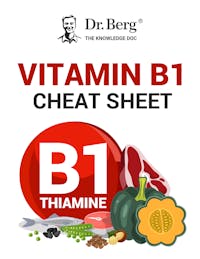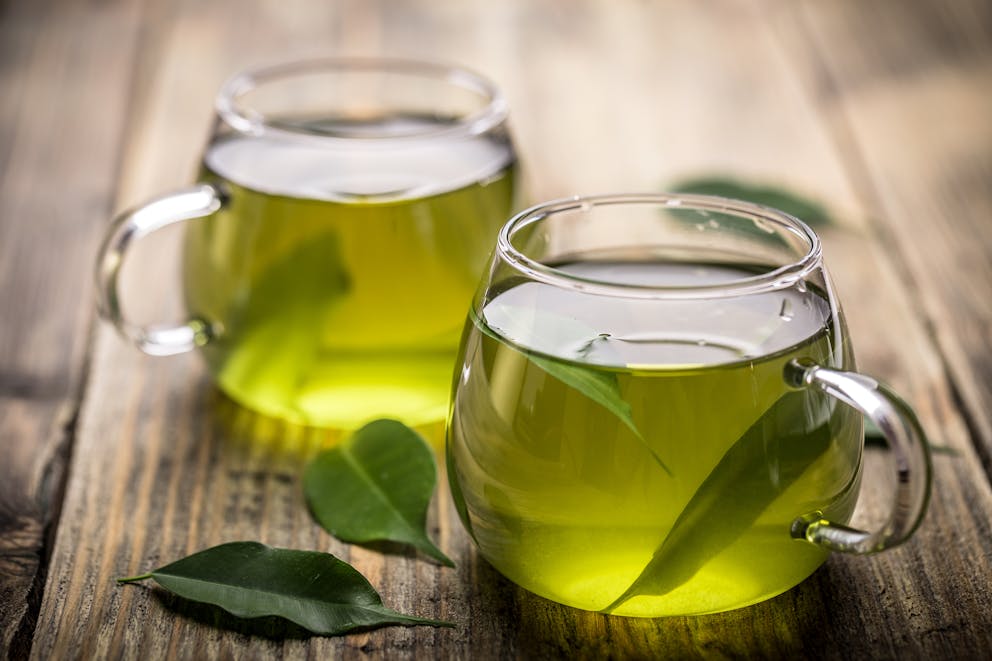7 Vitamins for Stress and Anxiety Relief

Vitamin B1 Cheat Sheet
Learn about the essential functions and benefits of vitamin B1
Understand the role of vitamin B1 in energy production and brain health
Recognize early signs and common causes of vitamin B1 deficiency
Discover the best dietary sources of vitamin B1
Get expert guidance on why avoiding synthetic vitamin B1 supplements is crucial

Vitamin B1 Cheat Sheet
Learn about the essential functions and benefits of vitamin B1
Understand the role of vitamin B1 in energy production and brain health
Recognize early signs and common causes of vitamin B1 deficiency
Discover the best dietary sources of vitamin B1
Get expert guidance on why avoiding synthetic vitamin B1 supplements is crucial

Vitamin B1 Cheat Sheet
Learn about the essential functions and benefits of vitamin B1
Understand the role of vitamin B1 in energy production and brain health
Recognize early signs and common causes of vitamin B1 deficiency
Discover the best dietary sources of vitamin B1
Get expert guidance on why avoiding synthetic vitamin B1 supplements is crucial

Vitamin B1 Cheat Sheet
Learn about the essential functions and benefits of vitamin B1
Understand the role of vitamin B1 in energy production and brain health
Recognize early signs and common causes of vitamin B1 deficiency
Discover the best dietary sources of vitamin B1
Get expert guidance on why avoiding synthetic vitamin B1 supplements is crucial

Vitamin B1 Cheat Sheet
Learn about the essential functions and benefits of vitamin B1
Understand the role of vitamin B1 in energy production and brain health
Recognize early signs and common causes of vitamin B1 deficiency
Discover the best dietary sources of vitamin B1
Get expert guidance on why avoiding synthetic vitamin B1 supplements is crucial

Vitamin B1 Cheat Sheet
Learn about the essential functions and benefits of vitamin B1
Understand the role of vitamin B1 in energy production and brain health
Recognize early signs and common causes of vitamin B1 deficiency
Discover the best dietary sources of vitamin B1
Get expert guidance on why avoiding synthetic vitamin B1 supplements is crucial

Vitamin B1 Cheat Sheet
Learn about the essential functions and benefits of vitamin B1
Understand the role of vitamin B1 in energy production and brain health
Recognize early signs and common causes of vitamin B1 deficiency
Discover the best dietary sources of vitamin B1
Get expert guidance on why avoiding synthetic vitamin B1 supplements is crucial

Vitamin B1 Cheat Sheet
Learn about the essential functions and benefits of vitamin B1
Understand the role of vitamin B1 in energy production and brain health
Recognize early signs and common causes of vitamin B1 deficiency
Discover the best dietary sources of vitamin B1
Get expert guidance on why avoiding synthetic vitamin B1 supplements is crucial

Vitamin B1 Cheat Sheet
Learn about the essential functions and benefits of vitamin B1
Understand the role of vitamin B1 in energy production and brain health
Recognize early signs and common causes of vitamin B1 deficiency
Discover the best dietary sources of vitamin B1
Get expert guidance on why avoiding synthetic vitamin B1 supplements is crucial

Vitamin B1 Cheat Sheet
Learn about the essential functions and benefits of vitamin B1
Understand the role of vitamin B1 in energy production and brain health
Recognize early signs and common causes of vitamin B1 deficiency
Discover the best dietary sources of vitamin B1
Get expert guidance on why avoiding synthetic vitamin B1 supplements is crucial

Vitamin B1 Cheat Sheet
Learn about the essential functions and benefits of vitamin B1
Understand the role of vitamin B1 in energy production and brain health
Recognize early signs and common causes of vitamin B1 deficiency
Discover the best dietary sources of vitamin B1
Get expert guidance on why avoiding synthetic vitamin B1 supplements is crucial

Vitamin B1 Cheat Sheet
Learn about the essential functions and benefits of vitamin B1
Understand the role of vitamin B1 in energy production and brain health
Recognize early signs and common causes of vitamin B1 deficiency
Discover the best dietary sources of vitamin B1
Get expert guidance on why avoiding synthetic vitamin B1 supplements is crucial

Vitamin B1 Cheat Sheet
Learn about the essential functions and benefits of vitamin B1
Understand the role of vitamin B1 in energy production and brain health
Recognize early signs and common causes of vitamin B1 deficiency
Discover the best dietary sources of vitamin B1
Get expert guidance on why avoiding synthetic vitamin B1 supplements is crucial

Vitamin B1 Cheat Sheet
Learn about the essential functions and benefits of vitamin B1
Understand the role of vitamin B1 in energy production and brain health
Recognize early signs and common causes of vitamin B1 deficiency
Discover the best dietary sources of vitamin B1
Get expert guidance on why avoiding synthetic vitamin B1 supplements is crucial

Vitamin B1 Cheat Sheet
Learn about the essential functions and benefits of vitamin B1
Understand the role of vitamin B1 in energy production and brain health
Recognize early signs and common causes of vitamin B1 deficiency
Discover the best dietary sources of vitamin B1
Get expert guidance on why avoiding synthetic vitamin B1 supplements is crucial

Vitamin B1 Cheat Sheet
Learn about the essential functions and benefits of vitamin B1
Understand the role of vitamin B1 in energy production and brain health
Recognize early signs and common causes of vitamin B1 deficiency
Discover the best dietary sources of vitamin B1
Get expert guidance on why avoiding synthetic vitamin B1 supplements is crucial

Vitamin B1 Cheat Sheet
Learn about the essential functions and benefits of vitamin B1
Understand the role of vitamin B1 in energy production and brain health
Recognize early signs and common causes of vitamin B1 deficiency
Discover the best dietary sources of vitamin B1
Get expert guidance on why avoiding synthetic vitamin B1 supplements is crucial

Vitamin B1 Cheat Sheet
Learn about the essential functions and benefits of vitamin B1
Understand the role of vitamin B1 in energy production and brain health
Recognize early signs and common causes of vitamin B1 deficiency
Discover the best dietary sources of vitamin B1
Get expert guidance on why avoiding synthetic vitamin B1 supplements is crucial

Vitamin B1 Cheat Sheet
Learn about the essential functions and benefits of vitamin B1
Understand the role of vitamin B1 in energy production and brain health
Recognize early signs and common causes of vitamin B1 deficiency
Discover the best dietary sources of vitamin B1
Get expert guidance on why avoiding synthetic vitamin B1 supplements is crucial

Vitamin B1 Cheat Sheet
Learn about the essential functions and benefits of vitamin B1
Understand the role of vitamin B1 in energy production and brain health
Recognize early signs and common causes of vitamin B1 deficiency
Discover the best dietary sources of vitamin B1
Get expert guidance on why avoiding synthetic vitamin B1 supplements is crucial

Vitamin B1 Cheat Sheet
Learn about the essential functions and benefits of vitamin B1
Understand the role of vitamin B1 in energy production and brain health
Recognize early signs and common causes of vitamin B1 deficiency
Discover the best dietary sources of vitamin B1
Get expert guidance on why avoiding synthetic vitamin B1 supplements is crucial

Vitamin B1 Cheat Sheet
Learn about the essential functions and benefits of vitamin B1
Understand the role of vitamin B1 in energy production and brain health
Recognize early signs and common causes of vitamin B1 deficiency
Discover the best dietary sources of vitamin B1
Get expert guidance on why avoiding synthetic vitamin B1 supplements is crucial

Vitamin B1 Cheat Sheet
Learn about the essential functions and benefits of vitamin B1
Understand the role of vitamin B1 in energy production and brain health
Recognize early signs and common causes of vitamin B1 deficiency
Discover the best dietary sources of vitamin B1
Get expert guidance on why avoiding synthetic vitamin B1 supplements is crucial

Vitamin B1 Cheat Sheet
Learn about the essential functions and benefits of vitamin B1
Understand the role of vitamin B1 in energy production and brain health
Recognize early signs and common causes of vitamin B1 deficiency
Discover the best dietary sources of vitamin B1
Get expert guidance on why avoiding synthetic vitamin B1 supplements is crucial

Vitamin B1 Cheat Sheet
Learn about the essential functions and benefits of vitamin B1
Understand the role of vitamin B1 in energy production and brain health
Recognize early signs and common causes of vitamin B1 deficiency
Discover the best dietary sources of vitamin B1
Get expert guidance on why avoiding synthetic vitamin B1 supplements is crucial

Vitamin B1 Cheat Sheet
Learn about the essential functions and benefits of vitamin B1
Understand the role of vitamin B1 in energy production and brain health
Recognize early signs and common causes of vitamin B1 deficiency
Discover the best dietary sources of vitamin B1
Get expert guidance on why avoiding synthetic vitamin B1 supplements is crucial

Vitamin B1 Cheat Sheet
Learn about the essential functions and benefits of vitamin B1
Understand the role of vitamin B1 in energy production and brain health
Recognize early signs and common causes of vitamin B1 deficiency
Discover the best dietary sources of vitamin B1
Get expert guidance on why avoiding synthetic vitamin B1 supplements is crucial

Vitamin B1 Cheat Sheet
Learn about the essential functions and benefits of vitamin B1
Understand the role of vitamin B1 in energy production and brain health
Recognize early signs and common causes of vitamin B1 deficiency
Discover the best dietary sources of vitamin B1
Get expert guidance on why avoiding synthetic vitamin B1 supplements is crucial

Vitamin B1 Cheat Sheet
Learn about the essential functions and benefits of vitamin B1
Understand the role of vitamin B1 in energy production and brain health
Recognize early signs and common causes of vitamin B1 deficiency
Discover the best dietary sources of vitamin B1
Get expert guidance on why avoiding synthetic vitamin B1 supplements is crucial

Vitamin B1 Cheat Sheet
Learn about the essential functions and benefits of vitamin B1
Understand the role of vitamin B1 in energy production and brain health
Recognize early signs and common causes of vitamin B1 deficiency
Discover the best dietary sources of vitamin B1
Get expert guidance on why avoiding synthetic vitamin B1 supplements is crucial

Vitamin B1 Cheat Sheet
Learn about the essential functions and benefits of vitamin B1
Understand the role of vitamin B1 in energy production and brain health
Recognize early signs and common causes of vitamin B1 deficiency
Discover the best dietary sources of vitamin B1
Get expert guidance on why avoiding synthetic vitamin B1 supplements is crucial

Vitamin B1 Cheat Sheet
Learn about the essential functions and benefits of vitamin B1
Understand the role of vitamin B1 in energy production and brain health
Recognize early signs and common causes of vitamin B1 deficiency
Discover the best dietary sources of vitamin B1
Get expert guidance on why avoiding synthetic vitamin B1 supplements is crucial

Vitamin B1 Cheat Sheet
Learn about the essential functions and benefits of vitamin B1
Understand the role of vitamin B1 in energy production and brain health
Recognize early signs and common causes of vitamin B1 deficiency
Discover the best dietary sources of vitamin B1
Get expert guidance on why avoiding synthetic vitamin B1 supplements is crucial

Vitamin B1 Cheat Sheet
Learn about the essential functions and benefits of vitamin B1
Understand the role of vitamin B1 in energy production and brain health
Recognize early signs and common causes of vitamin B1 deficiency
Discover the best dietary sources of vitamin B1
Get expert guidance on why avoiding synthetic vitamin B1 supplements is crucial

Vitamin B1 Cheat Sheet
Learn about the essential functions and benefits of vitamin B1
Understand the role of vitamin B1 in energy production and brain health
Recognize early signs and common causes of vitamin B1 deficiency
Discover the best dietary sources of vitamin B1
Get expert guidance on why avoiding synthetic vitamin B1 supplements is crucial

Vitamin B1 Cheat Sheet
Learn about the essential functions and benefits of vitamin B1
Understand the role of vitamin B1 in energy production and brain health
Recognize early signs and common causes of vitamin B1 deficiency
Discover the best dietary sources of vitamin B1
Get expert guidance on why avoiding synthetic vitamin B1 supplements is crucial

Vitamin B1 Cheat Sheet
Learn about the essential functions and benefits of vitamin B1
Understand the role of vitamin B1 in energy production and brain health
Recognize early signs and common causes of vitamin B1 deficiency
Discover the best dietary sources of vitamin B1
Get expert guidance on why avoiding synthetic vitamin B1 supplements is crucial
Maintaining optimal nutrient stores is crucial for physical and mental health, and several vitamins and minerals can help alleviate anxiety symptoms and improve the body’s ability to manage stress.
Let’s look at seven vitamins for stress and anxiety relief and discover effective ways to reduce stress and lower anxiety levels.

What are stress and anxiety?
Stress is a natural physiological response to a difficult or challenging situation and typically manifests as physical or emotional tension.
Stress triggers the release of stress hormones such as cortisol and adrenaline, which help your body cope with different stressors, including injury, trauma, workplace deadlines, psychological stress, or financial worries.
While positive stress can be motivating, negative and chronic stress is harmful and can lead to a weakened immune system, impaired sleep, high blood pressure, and increased risk of mental health conditions, including anxiety and depression.
Anxiety is typically characterized by excessive fear, worry, or apprehension and is often accompanied by a sense of impending danger, even in the absence of a real threat.
Anxiety that is persistent and interferes with a person’s daily life is indicative of an anxiety disorder, and the Anxiety and Depression Association of America (ADAA) estimates that almost 20 percent of U.S. adults suffer anxiety symptoms ranging from mild anxiety to generalized anxiety disorder.
Watch the video below to discover the best ways to manage stress and anxiety.
Can nutritional deficiencies increase stress and anxiety?
Various nutrients are needed to regulate the central nervous system, maintain cognitive function, and balance stress hormone levels, all of which are essential aspects of the body’s ability to deal with stressful events.
Nutritional deficiencies can disrupt these processes, potentially leading to heightened stress and anxiety levels.
Here are seven nutrients found beneficial for managing stress and relieving anxiety.
1. Magnesium
Magnesium supports optimal muscle function and acts as a natural muscle relaxant.
Lack of adequate magnesium can cause tight and tense muscles, which can exacerbate symptoms of anxiety.
Because of magnesium’s muscle relaxing properties, it has calming effects on the nervous system, and magnesium supplements have been found to improve sleep quality and emotional resilience.
In addition, magnesium activates gamma-aminobutyric acid (GABA), a neurotransmitter that calms the brain and helps reduce stress and anxiety.
Magnesium occurs in various elemental forms, and magnesium threonate and magnesium glycinate have been found to be the best form of magnesium for anxiety.
2. Vitamin B complex
The eight B vitamins, collectively known as vitamin B complex, can help reduce stress by supporting the production of neurotransmitters like serotonin and dopamine, which play critical roles in mood regulation and the body's stress response.
In addition, a study published in PLOS ONE found that B vitamins, including folate and vitamin B12, lower levels of the amino acid homocysteine.
Elevated homocysteine levels are associated with dysregulated neurotransmitter levels and have been implicated in developing anxiety and other mood disorders.

3. Vitamin C
Vitamin C enhances the body’s stress resilience by supporting the immune system and stimulating the production of stress-fighting neurotransmitters.
Research published in Nutritional Biochemistry also found that vitamin C is an anti-anxiety vitamin that balances cortisol levels, the body’s primary stress hormone.
The study concludes, “Vitamin C supplements produce fast therapeutic response and can be considered as a candidate for treating anxiety disorders.”
4. Vitamin D
Vitamin D plays a crucial role in managing anxiety and stress, and vitamin D deficiency can increase the risk of anxiety disorders.
Vitamin D regulates the production of stress-related hormones and helps prevent excess cortisol, which is associated with heightened stress levels and anxiety.
Supplementation with vitamin D3 may help alleviate anxiety symptoms and can be beneficial for individuals who are experiencing chronic stress.
In addition, taking vitamin D3 and K2 together can maximize the health benefits of vitamin D supplementation.
The best ratio of vitamin D3 and K2 is 1000:10, which means that it’s recommended to take ten mcg of vitamin K2 for every 1000 IU of vitamin D3.
5. Vitamin A
Adequate vitamin A levels are needed to effectively produce serotonin, which can help manage stress.
“Vitamin A has potent neuroprotective properties and is essential for the proper function of the nervous system,” explains Dr. Berg. “A healthy nervous system can better cope with stress and anxiety, as it helps regulate the physical responses to stressors.”

6. Vitamin E
Chronic inflammation has adverse effects on neuronal and cognitive functions and has been found to contribute to the development of anxiety symptoms and an impaired ability to cope with stress.
Vitamin E is a potent anti-inflammatory compound that’s particularly important in protecting brain tissue from inflammation, which may explain why dietary supplements containing vitamin E can aid in relieving stress and symptoms of anxiety.
7. Vitamin K
Vitamin K doesn’t directly impact neurological function. However, it has been found to play a role in managing or preventing a range of conditions linked to anxiety and stress.
For example, vitamin K2 can help reduce heavy periods by improving blood clotting, which has been found to lower anxiety and perceived stress in women suffering from excessive uterine bleeding, also known as menorrhagia.
While more research is needed in uncovering the vitamin K2 benefits for hair, deficiency is associated with bald pattern hair loss, which often is accompanied by anxiety, and maintaining healthy vitamin K status may slow down or even reverse hair loss.

More ways to lower stress
Stress is a physical manifestation of a complex interplay between your environment, lifestyle habits, and health status, and lowering stress often involves addressing multiple potential underlying factors simultaneously.
Here are nine ways to lower stress levels and improve overall well-being.
1. Adaptogenic herbs
Research published in the book "Adaptogens: Herbs for Strength, Stamina, and Stress Relief" found that natural supplements such as ashwagandha, Rhodiola rosea, and valerian root can be effective at reducing stress and improving feelings of well-being.
Ashwagandha is believed to be among the most potent adaptogens, a group of medicinal plants that can enhance your ability to adjust and adapt to physical and mental stressors.
Ashwagandha has been found to reduce cortisol and blood pressure levels and aid neurotransmitter balance, which promotes a calm and stress-resilient nervous system.
Rhodiola rosea and valerian root also have adaptogenic properties and may lower stress by interacting with GABA, an inhibitory neurotransmitter that promotes relaxation and reduces anxiety.
While adaptogenic herbs are generally considered safe, they can interfere with blood pressure regulation and interact with blood thinning medication, diabetes drugs, and hormone replacement therapy.
It’s crucial to consult a healthcare provider to discuss the use of adaptogens if you are taking prescription medication or have blood pressure issues to minimize the risk of potential side effects.

2. L-theanine
L-theanine is an amino acid found primarily in tea leaves, especially in black, white, and green tea.
A study published in Nutrients suggests that 200 mg of l-theanine daily has anti-anxiety and stress–lowering effects, possibly due to its ability to increase brain-derived neurotrophic factor (BDNF) levels.
BDNF is crucial for neuroplasticity, which is the brain's ability to respond and adapt to environmental inputs and stressors.
3. Omega-3 fatty acids
The omega-3 fatty acids EPA (eicosapentaenoic acid) and DHA (docosahexaenoic acid) play a vital role in regulating levels of neurotransmitters, including serotonin and dopamine.
Foods including oily fish, seafood, seeds, nuts, and plant oils such as flaxseed and walnut oil are rich sources of omega-3 fatty acids.
Inadequate dietary intake of these fats can result in omega-3 fatty acid deficiency linked to neurotransmitter imbalances, which can exacerbate stress and anxiety disorders.
4. Improve your sleep quality
Sleep plays a crucial role in regulating the body's stress hormones, and a lack of adequate sleep can significantly disrupt cortisol levels and heighten stress.
Getting enough restorative sleep helps maintain a balanced cortisol rhythm, with higher levels in the morning to help you wake up and lower levels at night to promote relaxation and sleep.
There are many reasons for poor sleep, and it’s crucial to identify and address factors that may contribute to persistent sleep issues, such as insomnia, sleep apnea, or nocturnal cramps.
5. Lower your carb intake
Eating sugar and carbs depletes nutrients, which increases the risk of nutritional deficiencies linked to anxiety and impaired stress management.
In addition, a diet high in carbs and sugars often causes rapid spikes and subsequent crashes in blood sugar levels.
These blood sugar fluctuations are a considerable stressor for the body and are often accompanied by irritability, anxiousness, and increased stress.
A nutritious low-carb diet like Healthy Keto® is an ideal meal plan that promotes healthy nutrient levels while keeping blood sugar levels stable.

6. Do intermittent fasting
Combining intermittent fasting with Healthy Keto maximizes the stress-reduction benefits of a low-carb diet.
During periods of caloric restriction, blood sugar levels remain stable, which can prevent blood sugar fluctuations and associated irritability, mood changes, and stress.
Research published in Nutrients investigated the benefits of fasting on mental health and stress resilience and found that “Fasting interventions have shown effectiveness in alleviating stress, anxiety, and depressive symptoms.”
Intermittent fasting may also have neuroprotective properties and support brain health, which may explain why time-restricted eating patterns are linked to improved cognitive function and resilience to stress.
7. Avoid the news
Avoiding the news or limiting your exposure to negative or distressing stories can be an effective strategy for managing stress.
News tends to emphasize negative events because they are considered more newsworthy, which can induce anxiety and stress.
8. Stay active
Staying active is key to supporting the body’s ability to deal with stress.
Engaging in physical activities, especially outdoors, such as walking, hiking, and gardening, stimulates the release of endorphins, which are natural chemicals that calm the nervous system and help counteract stress.
Staying active also promotes brain health and can improve sleep quality, which is crucial for stress management.
9. Change your environment
Your surroundings can have a significant impact on your stress levels and mental well-being.
A cluttered and disorganized environment can overwhelm you emotionally and contribute to feelings of stress. Simplify and declutter your living and working spaces to create a less stressful environment.
Certain people or situations can also trigger unnecessary stress, and it’s important to take steps to minimize or avoid them when possible.

Key takeaways
Nutrients nourish the central nervous system, regulate neurotransmitter production, and balance stress hormones, which is crucial for stress reduction and anxiety management.
The most effective vitamins for stress and anxiety relief include water-soluble B vitamins and vitamin C, and the fat-soluble vitamins A, D3, E, and K2.
In addition, magnesium, omega-3 fatty acids, l-theanine, and adaptogens such as ashwagandha, Rhodiola rosea, and valerian root have been found to enhance the body’s resilience to stress and can lower anxiety symptoms.
Additional vitamin K2 resources
A daily intake of vitamin D3 and K2 can help improve the skin's health
Some evidence suggests that vitamin K2 may positively affect erectile dysfunction
FAQ
1. Can taking vitamins and minerals reduce anxiety and stress?
Yes, taking vitamins and minerals can help reduce anxiety and stress.
Various nutrients are needed to maintain central nervous system function, balance stress hormone levels, and regulate neurotransmitter production. Nutritional deficiencies can disrupt these processes, which can trigger or exacerbate stress and anxiety.
2. Do daily vitamins help with anxiety?
Yes, in some cases, daily vitamins can help alleviate anxiety symptoms.
Vitamins, including B vitamins, vitamins C, D, and E, and magnesium, have a calming effect on the nervous system and enhance the body’s ability to deal with stressors, which has been found to reduce symptoms of anxiety.
3. What is the best vitamin for stress and anxiety?
B vitamins and vitamins A, C, D, and E promote balanced neurotransmitter levels and help lower stress hormones, including cortisol, which enhances stress resilience and can benefit individuals with anxiety disorders.
4. What are the top 7 supplements for stress and anxiety relief?
The top 7 stress and anxiety relief nutrients include B vitamins, vitamins C, A, D, E, and K, and magnesium.
5. What can I take for extreme stress?
If you are experiencing extreme stress, consider taking vitamin B complex, vitamins C and D, and magnesium.
In addition, adaptogenic herbs, including valerian root and ashwagandha, can enhance your body’s ability to withstand periods of extreme stress.
6. What are the best adaptogens?
Ashwagandha, Rhodiola rosea, and valerian root are potent adaptogenic herbs that have been used for centuries to reduce stress and improve feelings of well-being.
7. How can I reduce stress and anxiety naturally?
Reducing stress and anxiety naturally involves staying active, spending time in nature, and practicing deep breathing exercises to relax the body and mind.
In addition, consuming a nutritious diet low in carbs and processed foods, getting adequate sleep, and making time for hobbies, friends, and family minimizes the effects of daily stressors, which can help manage stress levels and anxiety.
8. Does vitamin D help with stress and anxiety?
Yes, vitamin D can help with stress and anxiety.
Vitamin D stimulates the production of neurotransmitters such as serotonin, which plays a vital role in mood and emotional regulation. In addition, vitamin D promotes healthy brain function, and maintaining optimal vitamin D levels has been found to lower the risk of anxiety disorders and stress-related symptoms.
Sources
https://journals.plos.org/plosone/article?id=10.1371/journal.pone.0012244
https://www.sciencedirect.com/science/article/pii/S0955286320304915
https://www.google.com/books/edition/Adaptogens/ZdOPDwAAQBAJ?hl=en&gbpv=0
Previous blog
Vitamin K2 Benefits for Hair
Popular
08/21/2024
47.1K views
05/22/2024
41.3K views
11/18/2024
245.1K views
03/18/2024
11/21/2022




